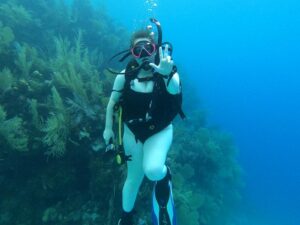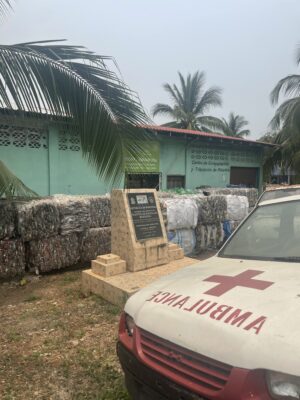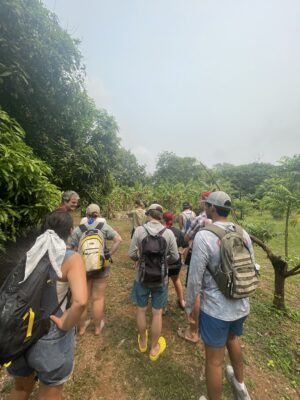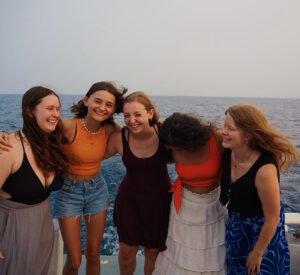Maymester Q&A: Exploring the intersection of climate change and tourism in Honduras
 Sophia Koss, Class of ’26, wanted to study abroad but wasn’t sure she could commit to a full semester away. The Vanderbilt Maymester program was the perfect solution. A double major in medicine, health, and society and anthropology, Sophia recently learned about the course Above and Below the Surface: The Caribbean between Climate Change and Tourism, which is held in the Honduran island of Utila. In an interview she shared what intrigued her about the class, what she learned, and how the experience influenced her mindset on climate change and tourism.
Sophia Koss, Class of ’26, wanted to study abroad but wasn’t sure she could commit to a full semester away. The Vanderbilt Maymester program was the perfect solution. A double major in medicine, health, and society and anthropology, Sophia recently learned about the course Above and Below the Surface: The Caribbean between Climate Change and Tourism, which is held in the Honduran island of Utila. In an interview she shared what intrigued her about the class, what she learned, and how the experience influenced her mindset on climate change and tourism.
Q: How did you hear about the course?
A: As a premed student, I didn’t know if I would be able to do a semester abroad. I asked myself, “If I’m not able to do a semester abroad, could I possibly do a Maymester?” Thankfully, with careful planning, I was able to do it. I started looking at different courses and I found that you could scuba dive for class credit. I had already been certified, so I thought it would be amazing to just go and learn more about the island of Utila. I was also curious about the link between anthropology and scuba diving, so I signed up. Speaking with the professor, Dr. Norbert Ross, I learned that the course was a lot more involved than I originally thought. Not only was it scuba diving, it was also traveling around the island and getting to explore and learn. I have had some friends in the past who have gone on this trip and other Maymesters and had wonderful things to say about it, so I knew this was going to be my “almost” semester abroad, being able to take a month to fully immerse myself in this experience.
Q: What were your assignments like?
 A: I thought it would be a lot of sitting down and doing homework assignments, but Dr. Ross did a great job using the homework as a way of interacting with people and going places, and that’s how we learned. We did a couple assignments before coming to the island. We did a project, and mine was learning about the medical centers of Utila. Some students did their project on climate change, some students did theirs on the coral around the island, some students did theirs on tourism. Then throughout the trip, students would talk about their projects and apply them to what we actually saw on the island, which was very unique. The trip involved a lot of adventuring—seeing things on the island and then being able to talk about different concepts of environmental studies and anthropology, and apply those concepts to what we were seeing around us. As a premed student, I was very excited to go to the medical center and learn about the two different types, private and public, and how accessible they are to people.
A: I thought it would be a lot of sitting down and doing homework assignments, but Dr. Ross did a great job using the homework as a way of interacting with people and going places, and that’s how we learned. We did a couple assignments before coming to the island. We did a project, and mine was learning about the medical centers of Utila. Some students did their project on climate change, some students did theirs on the coral around the island, some students did theirs on tourism. Then throughout the trip, students would talk about their projects and apply them to what we actually saw on the island, which was very unique. The trip involved a lot of adventuring—seeing things on the island and then being able to talk about different concepts of environmental studies and anthropology, and apply those concepts to what we were seeing around us. As a premed student, I was very excited to go to the medical center and learn about the two different types, private and public, and how accessible they are to people.
Q: What did this experience teach you?
A: I am an anthropology and MHS major, and I don’t really think about climate change and tourism as much as I should. It has made me more conscious now. I think it gave me an opening to see how applicable the two topics are to so many sectors, and how communities are affected in many different ways. It opened my eyes to what climate change is and what it means to impact the environment. I have taken some classes that have talked about climate change, like in biology I’ve learned about greenhouse gases and the biology behind it. But I also love the fact that as I’m on this trip, I get to actually see it. And the course is also great for people who aren’t majoring in environmental sciences. You go there and see why this is such an important topic to learn about, and why it’s so pressing to address this for the future. And just how being more conscious could make an impact on this issue.
Q: How did this course impact your view of climate change and tourism?
 A: When I came into this, I was looking at it through more of an anthropological lens, but I learned a lot about the environmental side of it, which impacts every sector. And as a tourist, you come in and learn about your impact and how you can be more conscious of it. For example, we talked about the trash that lines the island, which we were contributing to. We talked about climate change on a global scale and on a local scale, and that is where tourism comes in. How can tourists be more conscious of what they’re doing and make sure they’re exercising the correct actions towards the island? We are just visitors who are grateful to come and learn from the island, and we don’t want to create a negative impact that locals will have to deal with. There’s a lot of amazing things they’re doing to try and reverse and mitigate the effects of climate change. But as a tourist, I have to be more conscious of what I’m doing and make sure I’m not harming the island in ways that would cause long-term effects. The entire group did a wonderful job reflecting on this and making sure we were doing our part as tourists and understanding our impact on a global and local scale—and, as we travel to other places, to be more conscious of what we’re doing.
A: When I came into this, I was looking at it through more of an anthropological lens, but I learned a lot about the environmental side of it, which impacts every sector. And as a tourist, you come in and learn about your impact and how you can be more conscious of it. For example, we talked about the trash that lines the island, which we were contributing to. We talked about climate change on a global scale and on a local scale, and that is where tourism comes in. How can tourists be more conscious of what they’re doing and make sure they’re exercising the correct actions towards the island? We are just visitors who are grateful to come and learn from the island, and we don’t want to create a negative impact that locals will have to deal with. There’s a lot of amazing things they’re doing to try and reverse and mitigate the effects of climate change. But as a tourist, I have to be more conscious of what I’m doing and make sure I’m not harming the island in ways that would cause long-term effects. The entire group did a wonderful job reflecting on this and making sure we were doing our part as tourists and understanding our impact on a global and local scale—and, as we travel to other places, to be more conscious of what we’re doing.
Q: Would you recommend Maymester to other students?
A: This is a great option for people who don’t think a semester abroad is for them, or don’t think they have enough time for a semester abroad. Many premed students feel as though they can’t go abroad, they don’t have time: but you can. As a premed student, I got to learn about the medical system, which was the best part for me. Also, I learned something that was not only applicable to my studies, but also it shaped my mind in a very positive way on a topic I didn’t know about before. I would definitely recommend Maymester. Even if just for a month, it’s valuable to be able to go abroad and learn.
Sophia’s Maymester Tips
- Go with an open mind. There is room to look at each topic through a different lens and learn from people in different fields of study.
- Immerse yourself in local activities and learn from local traditions.
- Push yourself out of your comfort zone and be willing to try new things.
- Bring sunscreen! You will use a lot of it. However, sunscreen that contains UV blocking chemicals, such as oxybenzone and octinoxate, negatively impact coral. Try to choose a sunscreen that only has titanium dioxide or zinc oxide.
